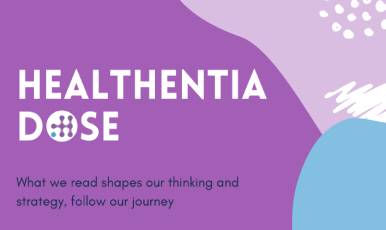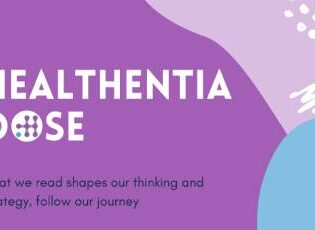
Welcome to our blog post series “Healthentia dose” with articles and interesting reads we come across from the fast-changing industry of #ClinicalResearch and #DigitalHealth. What we read, shapes our thinking and strategy, triggers our goal settings, and even pivots our businesses.
This is an insightful journey, and we want you to be part of it
In this Healthentia dose, we look at evidence-based research and health and how to live better longer.
“The Lean startup hits healthcare and Life sciences”
I wanted to start this post by sharing this interview that I came across of Steve Blank “The Lean startup hits healthcare and Life sciences” that seemed very relevant as ever since joining the team at Innovation Sprint, I have heard and used the methods for business planning from the Lean Startup book check out also our CEO’s article about it. These great tools for startups like the “business canvas” and “value proposition canvas” fit indeed very well in the Healthcare field and we have used these tools for the development of Healthentia. I loved these takeaway points “In the life sciences, finding the product-market fit is important but equally important is to understand who’s going to pay for it.” and “Clinicians and researchers are actually better at lean startups than almost any other field because, in medicine, you know what you don’t know” Do you know what you don’t know, to go and look for it?
“A heart bit is a heart bit”
Moving on, I have been researching a lot lately the digital biomarker space, and looking at the standardization required in order for digital endpoints to be equally assessed. I came across this most valuable crowdsourced list of digital endpoints from the Digital Medicine Society, collected the last few years in clinical trials. I am sure there are a lot more out there not listed here, as it is crowdsourced. They just released also a playbook as an industry guide to incorporating digital endpoints in their clinical trials. Check it out.
Population Real World Data
As the Covid pandemic has challenged the traditional Clinical trial models, it is very optimistic to see that the industry is adopting not only the use of tools like ePROs to collect Patient Outcomes, but also considering the use of telemedicine for virtual site visits and wearable devices to collect Real World Evidence aiming to offer more streamlined patient-centric trials. In this interactive report from IQVIA, it is stated that within the next ten years, the use of Digital Health is likely to be mainstream for most organizations delivering human health.
Symptom Tracking- What are the signs to monitor?
In the context of Real-world data collection are the following reads that are very close to our current research initiated with Healthentia Covid Symptom Tracking. From the months of April a few articles started to pop up claiming that certain research departments globally are demonstrating that digital measures can support public health. The question that people want to answer is “can we develop corona or pandemic early warning systems? What are the signs to monitor? We know, that a person infected will exhibit a fall in step count and an increase in pulse rate but is that enough? Are wearables good early warning systems? A take away is that “Wearable researchers treat the data not as an individual measurement, but rather as a baseline — a view of what’s “normal” for your body, from which they can spot deviations.” And this is where our research is now focused. Using healthentia ML module we create a composite digital biomarker as a multidimensional vector from the collected vital signs and outcomes coming from a patient, that can detect health behavior changes something like an alerting communication engine.
Salutogenesis – Evidence-based healthcare
And there is so much unrealized potential in health care delivery today. If healthcare starts to use the insights from population health data, it can become preventive of disease and more protective and promotive of positive health. Our whole system is working for curing instead of preventing it. I came across an interesting idea of a new paradigm called Salutogenesis. A bit futuristic you might think, looking at our current pathogenic approach, but if we start collecting lifestyle and behavior evidence (RWE) we need to also change our orientation to an evidence-based healthcare and research practice. Food for thought.
Making the most of your Extra time
More food for thought on health behavioral changes in the summer break came from reading this book, for my birthday, written by Camilla Cavendish called Extra time: 10 lessons for living longer better (only still 42y). Although it seemed at first “irrelevant” I have to say that I found it very enlightening and I wanted to share with you my 5 takeaways.
- We live in unprecedented demographic changes with global consequences and some of these takeaways can help us live a longer better life.
- “If exercise and diet was a pill, everyone would be taking it” This is how important these two are for living longer better. Also, not only a healthy diet is keen but calorie restriction like eating until you are 80%, not starvation might be the reason behind the longevity of the some Red zone areas.
- Keep learning “Old brains can and must learn new skills to keep in shape”
- “Aerobic exercise, social contact (meaningful relationships) and new challenges and purpose in life seem to be vital.”
- “We need to maintain our curiosity and venture into new areas beyond our comfort zone.”
But the best quote that I had only heard half before is that “The best time to plant a tree is 20 years ago. The second-best time is NOW”, therefore I agree with the author that it is a responsibility of our generation and as researchers in this domain, to lay the foundations of fair digital preventive health care systems.
Listen to Science
To finish off my first “Healthentia dose” since it has raised a lot of discussions about how safe young people are regarding the Covid infection and even hear about a herd immunity plan to face the Covid pandemic. I wanted to close with the quote from this journalist. “Herd immunity is an inoperable plan, teetering on a false assumption of elderly-cocooning, which encourages young people to play craps with the long-term health of their internal organs. The choice is yours. You can listen to the scientists. Or you can roll the dice with your guts” What’s your choice?
We love Science, we listen to it. #Stay safe, until next time.

Chief Product Officer, Innovation Sprint.
